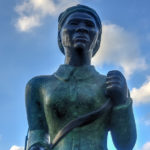“You never know what it’s gonna change
But it’ll always leave a mark
That’s the thing about praise”
(Benjamin William Hastings and Blessing Offor, “That’s the Thing About Praise”)
Scores of books and articles have been written to explain the role worship plays in the journey of individual disciples and in the life of the church. But rather than taking that approach to explaining the importance of worship, I would like to share a few episodes from my own journey with Christ.
I hope these episodes will encourage worship leaders in the midst of what can be a thankless job, remind pastors to support those in their worship ministries, and inspire believers to invest themselves—vocationally and devotionally—in the discipline of worship.
Beauty and heart
Growing up in a small, rural church as I did, I was around singing my entire life. My mother sang. My sister sang. We sang hymns in church. But most of this singing did nothing to stir my soul.
Part of the reason is, like most rural Baptist congregations of the time, my church had not yet learned to sing a dialect—to borrow language from pastor and church historian Dennis Wiles—I could call my own.
But there was a deeper problem. Our little congregation tried hard, but there was precious little beauty in its worship services.
I want to invite you to experience something through the eyes of my adolescent heart. I stand in the brand-new worship center of a historic Baptist church camp in Siloam Springs, Ark.
As I look around, I see an aesthetically pleasing, well-lit and acoustically sound space with views of the surrounding trees and the night sky. There are a thousand teenagers just like me, young men and women thirsty for something real, hungering for even just a taste of Christ’s presence.
On this night, we are introduced to “Shout to the Lord.” More than 30 years later, this song is known almost universally by Christians around the world, but back then, it was fresh and new. As we slowly pick up the words and tune, something amazing happens.
There isn’t a scrap of sheet music anywhere in that auditorium, at least among the worshipers. And yet, layer after layer of harmony emerges, each performed with astonishing clarity.
The high, sweet voices of sopranos and the rich intonations of tenors like me carry the melody, but mezzo sopranos and altos find their place, too. Then boys who never thought they could sing, or never thought singing was manly enough, find themselves carried away as their baritone, and even bass, voices join the chorus.
For the first time in my life, my heart bursts open, and tears flow down my face. I’ll never actually get to know most of these men and women, but for one night, for one week, we become one as we worship our risen King.
Just as importantly, I begin to understand God is not simply the author of conviction and judgment. He is the author of beauty, too. In that moment, men were men, and women were women, and yet they came together in a symphony of praise to the One who made them in his beautiful image and saved them through his beautiful Son.
I could not unsee what I saw that night. I could not unhear what I heard that night. The skeptic might chalk it all up to overactive amygdala, but that skepticism besmirches the beauty of that moment and misunderstands God’s purposes in creation.
The course of my life was altered by that experience of worship, and I don’t think God values it any less because I wasn’t a crusty old curmudgeon.
Unity and maturity
During the years that followed, worship was my refuge, my mentor and my comfort. I cherished my private moments of praise and lament, and I learned to lead congregations into the presence of God through song.
One summer, I sat in a field with tens of thousands of others as a parade of Christian bands played and sang. My seminary friends and I got to the concert early that morning, and we had a prime spot near the front of the assembled throng.
Behind us sat three teenage girls. They were not really that much younger than us, but it felt like a yawning chasm stood between us and them.
We spoke in low, relaxed tones about supposedly weighty matters, and we took frequent breaks from the broiling Texas heat. They, by contrast, talked incessantly. I don’t remember them moving all day. They just talked nonstop—no matter what band was on the stage.
Late that afternoon, it was Twila Paris’ turn to try and draw the attention of sweaty, tired people as they milled around looking for something cold to drink. Or there were the “kids” who, like our teenage companions, had more energy than sense.
For us, this particular performer was of special interest, for we knew of her history as a writer of worship songs. At first, she only performed her latest adult contemporary hits. Then, something remarkable happened—just as it did in that climate-controlled, architecturally pleasing chapel years before.
The mood on the stage became more subdued, and the chords of a familiar tune filled the air. It was “We Will Glorify,” and with the first note, the chattering behind us ceased. And then, those adolescent voices joined perhaps 70,000 or more others, covenanting together to “glorify the Lamb.”
There aren’t enough of those kinds of events. In that field, people from every race, denomination and generation joined their hearts as well as their voices. For one precious moment, unity was found. And in its shadow, three adolescent girls grew up a little. So did some seminary students.
Suffering and comfort
Worship gave me language to express my longings for the good things of God, and it coaxed me along toward spiritual maturity. But more often than anything else, I have experienced worship as a faithful, tender companion in suffering.
Cindy Morgan’s “I Will Be Free” was not, as far as I know, used in congregational worship, but its use in my private experiences of God’s presence carried me through times of deep personal pain.
Steven Curtis Chapman’s “Be Still” and Chris Tomlin’s “Amazing Grace (My Chains Are Gone)” ministered to my family in the aftermath of my uncle’s suicide.
“The Goodness of God” was an anthem for my wife and me after she was diagnosed with breast cancer.
And Barlow Girl’s “Never Alone,” along with Cory Asbury’s “Reckless Love” and “Egypt,” helped me reinterpret my suffering as an arena for the expression of God’s fathomless love rather than as evidence of God’s disavowal of me and disdain for my pain.
But if there is one experience that exemplifies how God’s mercy has been expressed to me in worship, it is an event that occurred after a cancer support group meeting in the fall of 2022.
My wife and I walked out of the meeting, only to discover the church where the group met was having a praise night in the sanctuary. We walked in and immediately joined our voices with hundreds of others, many of whom had become precious to us during and after our time at that church.
They were singing Phil Wickham’s “Living Hope,” and before we knew it, we were crying and lifting our hands, just as we also lifted our voices.
I’ll never forget being embraced by a retired Air Force officer after the service, who loved us enough to add his tears to our own. My wife never will forget the encouragement she received from the pastor’s wife, who forcefully declared her soul-rending diagnosis would not end her life.
God and us
Sometimes, I hear pastors and theologians browbeating their audience with the dictum, “Worship is not about you.”
At one level, that certainly is true. We obey the psalmist’s exhortation to “enter his gates with thanksgiving and his courts with praise” (Psalm 100:4), because God is God and God is worthy.
Nevertheless, I fear, in our zeal to combat the narcissism so rampant in our culture and in our churches, we have misrepresented both God and worship.
God is love, which means God is always and eternally concerned about those whom he created. Worship is our opportunity to bring not only our praise, not only our lament, but also our whole selves into God’s presence. And when we do that, we should not be surprised when God does many beautiful and surprising things in, through and for us.
Wade Berry is pastor of Second Baptist Church in Ranger and has been a resident fellow in New Testament and Greek at B.H. Carroll Theological Seminary. The views expressed in this opinion article are those of the author.















We seek to connect God’s story and God’s people around the world. To learn more about God’s story, click here.
Send comments and feedback to Eric Black, our editor. For comments to be published, please specify “letter to the editor.” Maximum length for publication is 300 words.